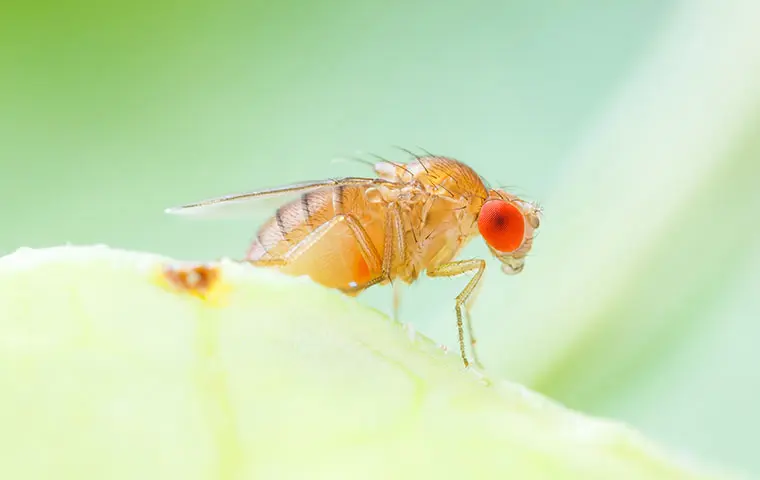Fruit flies are tiny yet persistent creatures that are a common nuisance in the North Carolina Raleigh/Cary/Durham Triangle area. But where do fruit flies come from, and why are they making the food in your home their next buffet?
Keep reading to know more about where fruit flies come from and why they’re attracted to the yummy goods in your kitchen. Plus, we’ll even give you some key tips and tricks to keep these pests out for good!
Where Do Fruit Flies Come From
Despite lacking a traditional nose, fruit flies can pick up on airborne odors with remarkable precision using their antennae as scent detectors.
This keen sense of “smell” helps them locate potential food sources, often leading them to our kitchens, where fruits and vegetables are readily available. Furthermore, their small size allows them to exploit vulnerabilities in our living spaces, squeezing through gaps in kitchen window screens or doorways.
So, where do fruit flies come from?
When fruit flies suddenly appear indoors, they typically originate from existing populations in the immediate environment or external sources. Here are a few common scenarios that can lead to an influx of fruit flies indoors:
- Infested Produce: One of the most common sources of indoor fruit fly infestations is infested produce that you bring into your home. Fruit flies can lay their eggs on ripe or overripe fruits and vegetables. Even if the eggs or larvae are not immediately visible, they can hatch later and lead to an infestation.
- Decaying Organic Matter: Fruit flies are attracted to decaying organic matter, including food scraps, compost, and trash. If organic materials in your home have started to decompose, fruit flies can be drawn to them and lay their eggs there.
- Drains: Fruit flies can breed in the organic matter that accumulates in gutters, particularly those not regularly cleaned. This can include sink drains, shower drains, and floor drains. The moisture and nutrients in the drain provide a suitable breeding environment.
- External Sources: Fruit flies can also enter your home from outside through open doors, windows, or cracks. If there are ripe fruits or decaying materials outside your home, fruit flies may be attracted to them and find their way indoors.
To address fruit fly infestations indoors, identify and eliminate the breeding sources. Start by discarding infested produce, cleaning up decaying organic matter, and addressing drain issues. Additionally, insect traps, fruit bowl covers, and good sanitation practices can help prevent future infestations.
Handling Fruit Fly Infestations
Dealing with a fruit fly infestation can be tough. Even after eliminating the visible sources of fruits, these insects can persist by seeking alternate breeding grounds.
Partially clogged plumbing drains and damp and sour-smelling mops and sponges become havens for fruit fly reproduction.
For homeowners grappling with fruit fly invasions, a practical do-it-yourself (DIY) solution can provide relief.
A homemade vinegar trap can be a highly effective solution. This simple yet smart trap takes advantage of fruit flies’ attraction to the scent of cider vinegar. Follow these steps to create and use the trap:
- Materials Needed: You’ll need a glass or jar, cider vinegar, and a sandwich baggie.
- Set Up the Trap: Cut the sandwich baggie to create a funnel-like shape. This will serve as the entrance to the trap.
- Place the Bait: Pour a small amount of cider vinegar into the glass or jar. The aroma will attract the fruit flies.
- Position the Funnel: Place the baggie funnel into the glass or jar. Ensure the funnel’s narrow end points downward inside the container.
- Capture the Fruit Flies: Fruit flies will be lured by the vinegar scent and enter the trap through the funnel. However, once inside, they won’t be able to escape.
- Keep it Effective: For the trap to work consistently, replace the cider vinegar every few days to maintain its alluring effect.
Understanding the sources and behaviors of fruit flies provides valuable insights into managing and preventing infestations in Raleigh homes. Homeowners can implement proactive measures by recognizing their exceptional olfactory abilities, hidden egg deposits on produce, and the persistence of infestations.
If you have any questions about fruit flies or any other pests or our pest control programs, let your Raleigh, NC Pest Control company give you a hand.
Innovative Pest Solutions… a solution to all your pest needs.







